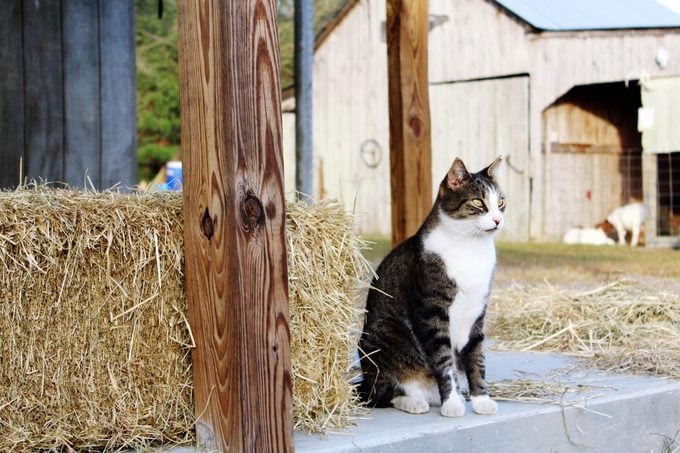Explore the fascinating life of barn cats and uncover essential tips for their care, well-being and safety.

What Are Barn Cats?

I grew up on a farm, and our barn cats were an integral and valued part of our family. Now that I have my own homestead, I gladly welcomed several rescue barn cats from the shelter. They needed a safe, warm home, food and a little human connection, and the cats give me an effective and natural way of keeping rodent numbers down.
Feral and semi-feral cats don’t always make good house pets. They prefer life outdoors and they’re never really tame, so rescuers often find it difficult to place them. But my gang is happy, healthy and great at dispatching rodents. And all cats like a little bit of fuss and attention — on their own terms, of course.
On This Page
What Are Barn Cats?
Barn cats are semi-feral or feral felines that primarily live on farms, ranches or other rural properties. They’re known for their strong hunting instincts. They play a crucial role in rodent control and maintain a balanced ecosystem in rural areas. But they may not be as affectionate or sociable as pampered house cats, and can sometimes be more difficult to handle.
The age of a cat, how long it’s been out in the wild and its experience with humans can determine how standoffish or aloof they are. But as with any animal, you can build trust with patience and perseverance. They still need food, shelter and occasional veterinary attention. Some may even come to enjoy a little ear or chin scratch.
Barn Cat vs. House Cat
The main differences between barn and house cats are their living environment and the level of human interaction they experience. Barn cats are more independent and self-reliant, while house cats rely more on human companionship and care.
Some barn cats may be too feral to transition into house cats. But others can adapt with time and patience, especially if they’re introduced to indoor living at a young age. Conversely, a house cat may struggle to survive as a barn cat if it lacks hunting skills and adaptability.

How To Care for Barn Cats
Barn cats are generally low-maintenance, but you still need to meet their basic needs to make sure they’re healthy and happy.
- Food: While barn cats are excellent hunters, they still a consistent supply of good quality cat food. This ensures proper nutrition and prevents them from relying solely on hunting, which may not always yield enough food.
- Water: As with any animal, they need access to fresh water, changed daily.
- Shelter: Provide a safe, warm, dry place for the cats to rest and escape from harsh weather. That’s where the “barn” part comes in, or a dedicated cat house. My cats can come inside my home via a door flap, but they also have nice warm, sheltered beds in the outbuildings.
- Regular inspections: Keep an eye on your barn cats signs of injury or illness. Pay attention to the way they move and the general condition of their body and fur. Check their eyes for infection, irritation and clarity, and make sure they have nice dry noses with no sign of discharge. If you don’t treat them regularly for fleas and ticks, check them for these parasites.
- Spay/neuter: To control the barn cat population and prevent unwanted litters, it’s essential to spay and neuter your barn cats. This also reduces fighting and territorial behaviors.
Because barn cats have free access to the outdoors, they don’t need a litter box.
How To Keep Barn Cats Safe From Predators
Barn cats face various threats from predators, but there are measures you can take to keep them safe:
- Provide secure shelter: Make sure the cats can retreat to a safe place when they feel threatened. A sturdy cat shelter with a small entrance that predators cannot access is ideal.
- Install predator deterrents: Motion-activated lights or noisemakers can scare off potential predators like raccoons, coyotes or owls.
- Keep food secure: Store food in airtight containers. Avoid leaving it out overnight, which can attract predators.
- Vaccinate and treat for parasites: Regular veterinary care can protect your barn cats from diseases and parasites that may weaken their immune system. Any illness makes them more vulnerable to predators.




















